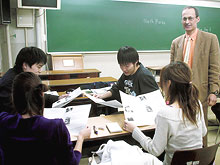Language − basis of communication and foundation of all disciplines

- Why must students study foreign languages?
- Because foreign languages are important as the foundations of learning in general. Education of English and other foreign languages is one of the pillars of liberal arts education. While language learning greatly helps develop a wide understanding of other cultures, the tough process required to master a foreign language also fosters the logical thinking and verbal expression power that are fundamental to subsequent learning and research. By means of language learning, one can develop their mental capacities and refine their ability to express themselves.
- Why is English compulsory?
- Because that enables students to cope with the demands of a globalized society. Whether in the world of business or in academia in the natural, human, and social sciences, the role of English as a form of lingua franca is likely to grow even more pronounced in the years ahead. Learning English or another foreign language is also essential to provide a means of communication with people of different nationalities.
- What languages are taught other than English?
- German, French, Russian, and Chinese.
- What is the foreign language teaching staff like?
- There are four full-time instructors of English, and two of French. All of them, including part-time lecturers, have at least master’s degrees in languages or literature (some have Ph.D.) and are active in their fields of research. Some have experience of extended study overseas, and others are native speakers of the languages that they teach.
- What are the benefits of learning another foreign language in addition to English?
- Many other colleges make it compulsory for students to take a second foreign language, because acquiring another language in addition to English has been considered a prerequisite for being well-educated. Learning a foreign language leads to discovery of new cultures, in turn teaching us to look at our own language in a new light. The new perspective gained through learning a second language, in addition to those given by our own language and English, will be beneficial far beyond one’s time at college, and is an investment for the rest of one’s life. As TUS has concluded exchange agreements with institutions in France, Germany, Russia, and China, learning these languages can, in the long run, also open the door to studying in these countries after finishing graduate courses in Japan. A second foreign language also broadens future career options, as reflected by the fact that some of our students have taken jobs at research institutes operated by foreign firms.
- I am worried about studying another language as I am poor at English.
- Being bad at English is not an obstacle to learning another foreign language. Learning the structure of a completely different language may even give one a fresh insight into English and have a positive effect on one’s English study.
- Is there anything particularly distinctive about the way English is taught at TUS?
- In order to equip students for globalization and to promote efficient learning, we have started teaching students in small groups divided up according to proficiency level, beginning with the 2006 intake, with a view to their taking the TOEIC test. Upon admission, all students take the placement test. They are then assigned to classes based on their results to ensure that teaching can be better tailored to individual abilities in order to efficiently develop their communication skills.
- How should one go about studying a foreign language outside classrooms?
- You had better set yourself clear goals. If your goal of studying language is to make yourself more employable, for example, you might set yourself a target of scoring 600 on the TOEIC test, or passing grade 1 of the French or German proficiency exam. If you like films, you might aim to understand The Matrix or Ame´lie without subtitles. If you like to email messages, you could correspond online with a college student overseas in a foreign language. If a fan of fantasy literature, you might aim to read the Harry Potter books in the original. Making studying fun ensures that you stick at it.
- Who teaches foreign languages?
- The full-time teaching staff are as follows.
Name Research interests Professor Makoto Shimizu - Computer-assisted language learning
- Corpus linguisticsProfessor Yukimitsu Namiki - Comparative research on English and Russian literature Professor Etsuko Oishi - English linguistics Associate Professor
Anna Bugaeva- Linguistic Typology, Ainu, Northeast Asian Languages Associate Professor
Jeffrey Stewart- Vocabulary Acquisition, Language Testing Associate Professor
Teiko Nakamaru- European literature Junior Associate professor
Nozomi Enomoto- Cultural anthropology, Ethnology Junior Associate professor
Masahiko Ohmura- Sociology Junior Associate professor
Phillip Rowles- Foreign language teaching Junior Associate professor
Ryoko Harikae- European literature Junior Associate professor
Shin-Ichi Kitada- English linguistics Junior Associate professor
Youko Asari- Foreign language teaching Junior Associate professor
Simpson William- Foreign language teaching

